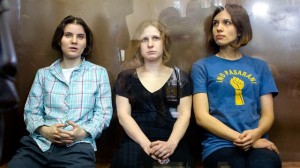Segregate ai cinfini della Russia due delle Pussy Riot: Maria Alyokhina (al centro nella foto) in una prigione degli Urali a 1200 km da Mosca, Nadezhda Tolokonnikova (a destra, con la maglietta “No pasaran”) nella Mordovia a oltre 500 km da Mosca. Putin vuole seppellirle lontano dagli occhi del mondo. Leviamo alta la nostra voce. Si protesti contro questa esibizione dittatoriale in Russia ai danni di ragazze poco più che ventenni, ree di aver chiesto libertà. L’articolo è dell’Independent del 22.10.12
Convicted Pussy Riot pair are sent to remote prison colonies
MOSCOW
MONDAY 22 OCTOBER 2012
Two members of the anti-Putin band Pussy Riot have been sent to remote prison colonies to serve their sentences for hooliganism, according to supporters of the group.
Maria Alyokhina, 24, will serve her sentence at a prison in the Perm region in the Ural Mountains, about 800 miles east of Moscow, while Nadezhda Tolokonnikova, 22, has been sent to a prison in the Volga republic of Mordovia, 350 miles south-east of Moscow,
“Nadya… was sent to Mordovia. A camp of hell,” the modern art group Voina said on Twitter, citing sources inside the Moscow prison where the two were being held.
Voina is a controversial group of performance artists that includes Tolokonnikova’s husband, Peter Verzilov. “These are the harshest possible camps that could have been chosen,” other members of Pussy Riot said on their own Twitter account. Both regions host several prisons and it was not clear which colonies to which the women had been sent. Prison authorities declined to comment on the women’s whereabouts. Alyokhina and Tolokonnikov were sentenced to two years’ imprisonment for “hooliganism motivated by religious hatred” over a crude “punk prayer” they performed in Moscow’s main cathedral, Christ the Saviour, on 21 February.
At an appeal earlier this month a judge freed a third band member, Yekaterina Samutsevich, on the grounds that she had been detained by security guards before she was able to take part in the performance. Russia’s prison colonies are camp-like institutions, some of which were part of the Soviet-era gulag network. While the two women, due for release in March 2014, were spared the toughest “hard” regime institutions, conditions will still be harsh.

